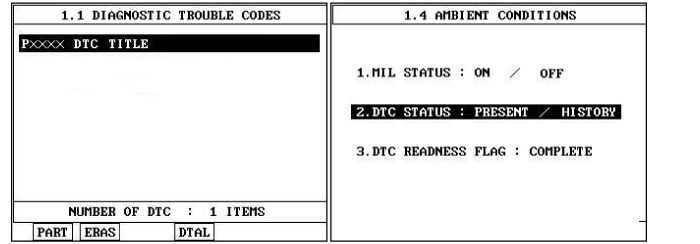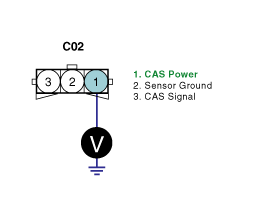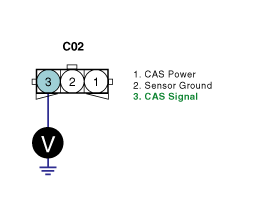Read "DTC Status" parameter.


The Chassis Acceleration Sensor (CAS) consists of a piezoelectric vibration pick up which detects vertical acceleration of the vehicle. The sensor signal is used by the ECM to determine the degree of vertical movement of the car, for example, on a bumpy road. Since this may also cause uneven engine running, the ECM uses the signal to distinguish the phenomenon from actual misfiring.
If the value exceeds threshold value, the ECM judges this as a fault and DTC P1307 is set.
Item | Detecting Condition | Possible Cause |
DTC Strategy | ● Input signal check | ● Contact resistance in connectors ● Open or short in signal circuit ● Open in ground circuit ● Open or short in power circuit ● Faulty CAS ● Faulty ECM |
Enable Conditions | ● No vehicle speed sensor signal > 3sec | |
Threshold Value | ● Measured Voltage - Modelde Voltage > 0.2V | |
Diagnostic Time | ● 15 sec | |
MIL | ● ON |
Acceleration (G) | -5 | -3 | -1 | 0 | 1 | 3 | 5 |
Output Voltage (V) (Approx.) | 0.26 ~ 1.74 | 1.16 ~ 1.44 | 2.05 ~ 2.15 | 2.5 | 2.85 ~ 2.95 | 3.56 ~ 3.84 | 4.26 ~ 4.74 |
Connect scantool to Data Link Connector(DLC).
IG "ON" & ENG "OFF".
Select "Diagnostic Trouble Codes(DTCs)" mode, and then Press F4(DTAL) to check DTC'sinformation from the DTCs menu.
Confirm that "DTC Readiness Flag" indicates "Complete". If not, drive the vehicle within conditionsnoted in the freeze frame data or enable conditions noted in the DTC detecting condition.
Read "DTC Status" parameter.

Is parameter displayed "History(Not Present) fault"?
History fault : DTC occurred but has been cleared.
Present fault : DTC is occurring at present time.

▶ Fault is intermittent caused by poor contact in the sensor’s and/or ECM’s connector or wasrepaired and ECM memory was not cleared. Thoroughly check connectors for looseness,poor connection, bending, corrosion, contamination, deterioration, or damage.Repair or replace as necessary and then go to "Verification of Vehicle Repair" procedure.
NO

▶ Go to "Terminal and Connector Inspection" procedure.
Many malfunctions in the electrical system are caused by poor harness and terminals. Faults canalso be caused by interference from other electrical systems, and mechanical or chemical damage.
Thoroughly check connectors for looseness, poor connection, bending, corrosion, contamination,deterioration, or damage.
Has a problem been found?

▶ Repair as necessary and go to "Verification of vehicle Repair" procedure

▶ Go to "Power Circuit inspection" procedure.
Ignition "OFF".
Disconnect CA sensor connector.
Ignition "ON" & Engine "OFF".
Measure voltage between terminal "1" of sensor harness connector and chassis ground.
Specification : Approx. 5V

Is the measured voltage within specifications?

▶ Go to "Signal circuit inspection" procedure.

▶ Check for open or short in power harness. Repair as necessary and then go to "Verification of Vehicle Repair" procedure.
Ignition "OFF".
Disconnect CAsensor connector.
Ignition "ON" & Engine "OFF".
Measure voltage between terminal "3" of sensor harness connector and chassis ground.
Specification : Approx. 5V

Is the measured voltage within specifications?

▶ Go to "Ground circuit inspection" procedure.

▶ Check for open or short in signal harness. Repair as necessary and then go to "Verification of Vehicle Repair" procedure.
Ignition "OFF".
Disconnect CA sensor connector.
Measure resistance between terminal 1 of harness connector and chassis ground.
Measure resistance between terminal 1 and 2 of harness connector.
Specification : "A" - "B" = Below 200mV

Is the measured resistance within specifications?

▶ Go to "Component inspection" procedure.

▶ Check for open in ground harness. Repair as necessary and then go to "Verification of Vehicle Repair" procedure.
Check Knock sensor.
Substitute with a known - good Knock sensor and check for proper operation.
Is the signal normal?

▶ Replace Knock sensor and go to "Verification of Vehicle Repair" procedure.

▶ Substitute with a known - good ECM and check for proper operation.If the problem is corrected, replace ECM and go to "Verification of Vehicle Repair" procedure.
After a repair, it is essential to verify that the fault has been corrected.
Connect scan tool and select "Diagnostic Trouble Codes(DTCs)" mode.
Clear the DTCs and Operate the vehicle within DTC Enable conditions in General information.
Are any DTCs present ?

▶ Go to the applicable troubleshooting procedure.

▶ System is performing to specification at this time.